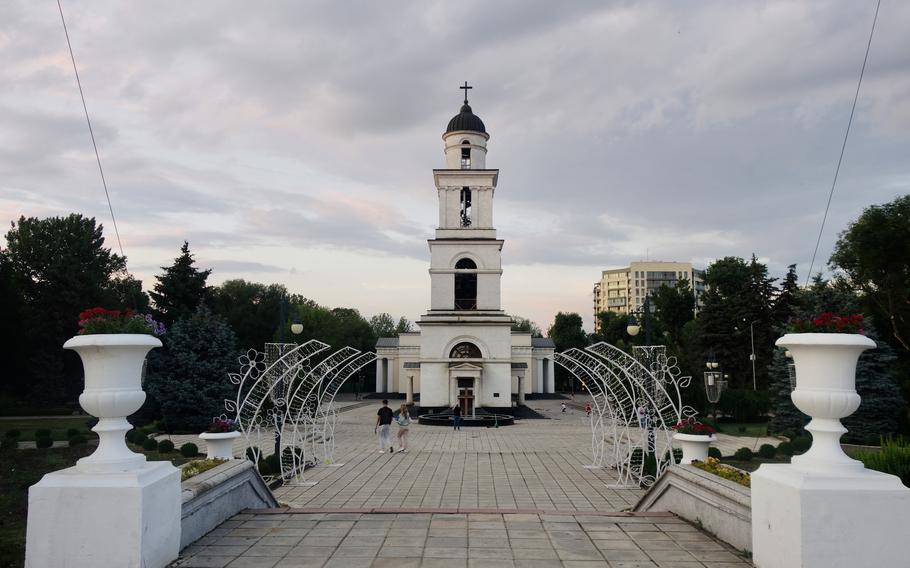
The Nativity Cathedral in the center of Chișinău, Moldova. (Svetlana Shkolnikova/Stars and Stripes)
CHIȘINĂU, Moldova — The head of Moldova’s border police had no doubt in 2014 that the pro-Russian uprising bubbling up in Ukraine’s east would eventually escalate into a full-scale invasion.
Rosian Vasiloi worked in Ukraine at the time and after visiting the front line, warned his Ukrainian colleagues that Russian President Vladimir Putin would one day pursue more territory.
He walked away from the battlefield with a sense of trepidation. But he also felt a warm appreciation for Ukrainian soldiers fighting the first Russian onslaught and the American-led effort to train them.
“I’m very happy that what the United States was doing in Ukraine it’s now doing in Moldova,” Vasiloi said in his office in Moldova’s capital, Chișinău, a giant Ukrainian flag hanging to his left. “It’s important to know that in this tough time, we are not alone.”
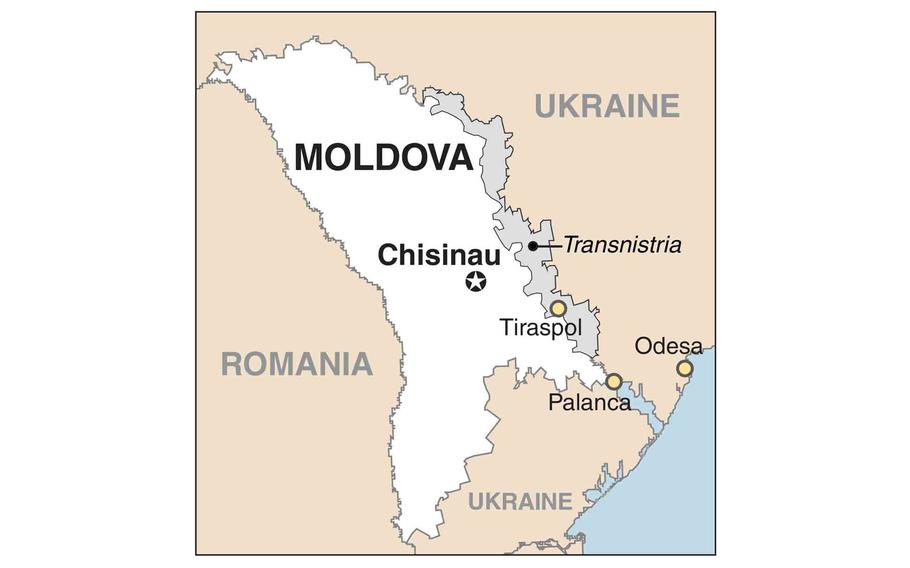
(Noga Ami-rav/Stars and Stripes)
More than a year after Russia ignited the largest armed conflict in Europe since World War II, fears of the war spilling over into tiny Moldova, a former Soviet republic of about 2.6 million people wedged between Romania and Ukraine, have subsided. But Moldova remains on edge as war rages next door.
It contends with relentless Russian destabilization efforts, including disinformation campaigns and anti-government protests staged by Kremlin-backed forces, and faces a longstanding security challenge in Transnistria, a secessionist enclave on Ukraine's border with Moldova that has been occupied by Russian troops since 1992.
There is also the persistent danger from Russian missiles overshooting Ukrainian targets and landing in Moldova. Rocket fragments have been found on Moldovan territory at least four times and Moldovan border guards in Palanca, a southern border crossing with Ukraine, say they can sometimes see missiles fired from Russian warships in the Black Sea.
“It’s true that at the moment there’s not an imminent military threat for our country,” said Col. Ion Rotaru, chief of the Moldovan Ministry of Defense’s international cooperation department. “But being a neighbor of Ukraine and having this so-called Transnistria region in our country is a potential military risk.”
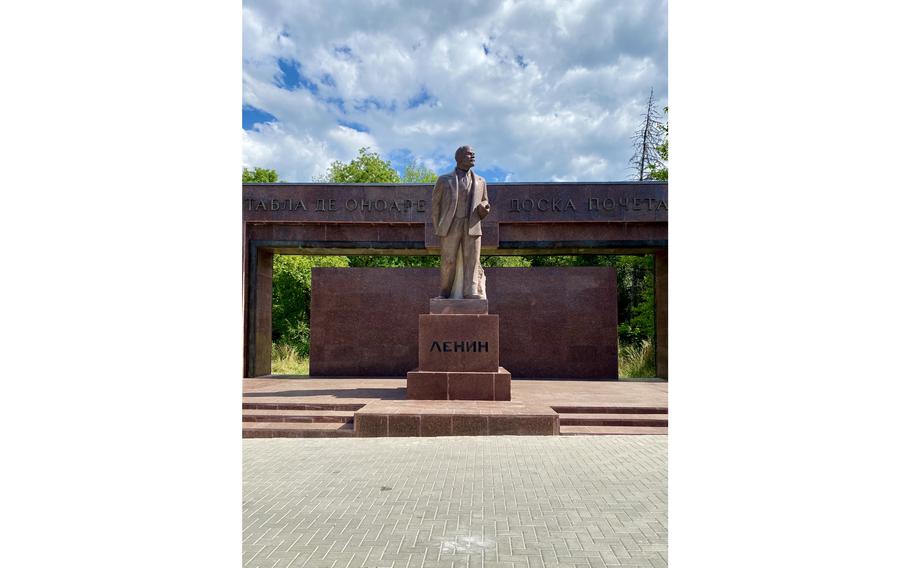
A monument to the Soviet leader Vladimir Lenin in Chișinău, the capital of Moldova. The former Soviet republic of about 2.6 million people has been the target of Russian destabilization efforts. (Svetlana Shkolnikova/Stars and Stripes)
The turmoil has accelerated two of Moldova’s most pressing goals: closer integration with the European Union and modernization of Moldova’s 6,500-member military.
For the latter, Moldova has turned to a growing coalition of Western partners and a 27-year partnership with the North Carolina National Guard, which will have about 50 engagements with the Moldovan army this year alone.
“The pace has picked up because there’s much more intensity from the Moldovan side,” said U.S. Ambassador to Moldova Kent Logsdon. “There’s been a lot of support from our side, I think that was already there, but frankly there’s also been more financial support, especially on the military side.”
The U.S. upped its military aid to Moldova from $3 million to $30 million since the start of the Ukraine war, he said, and will likely continue that level of commitment going forward. A majority of the funds are dedicated to replacing Soviet-era equipment from the 1960s to 1980s with modern materiel.
“February 24 raised a big question mark about the technique and equipment of the national army,” said Rotaru, referring to the date Russia invaded Ukraine last year.
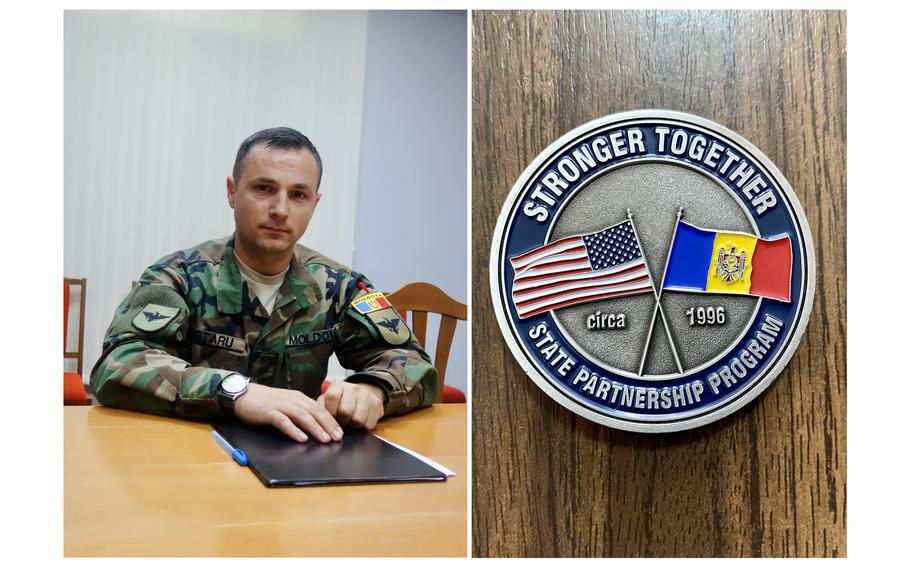
At left is Col. Ion Rotaru, chief of the Moldovan Ministry of Defense’s international cooperation department. At right, Rotaru keeps a medallion in his office commemorating the long partnership between the Moldovan military and the North Carolina National Guard. (Svetlana Shkolnikova/Stars and Stripes)
Moldova is attempting to reverse decades of underinvestment in the military after a succession of pro-Russian governments and fears of antagonizing Moscow. The current Europe-leaning administration aims to balance a neutrality enshrined in the country’s constitution with a changed threat landscape that Vasiloi, the border police chief, divides into “before February 24 and after February 24.”
“Now there is a clear understanding of who is your enemy and who is your friend,” he said.
Rotaru said neutral countries such as Austria, Ireland and Switzerland can serve as models for Moldova and argued neutrality does not prevent his nation from forging closer ties with military alliances like NATO or boosting the defense budget, which is up 70% this year compared to 2022.
“We are neutral but this is not an obstacle to have international cooperation and common exercises with our partners and neighbors,” Rotaru said.
In February, the army deployed troops to Lebanon for Moldova’s first United Nations peacekeeping mission — an action Logsdon, the U.S. ambassador, described as “huge.”
In September, Moldova and the North Carolina National Guard will come together for drills and training on various weapon systems. The annual exercise is part of a deep relationship between the two military forces that has evolved from a partnership based on security objectives to one that also encompasses education, health, humanitarian assistance, business and culture cooperation.
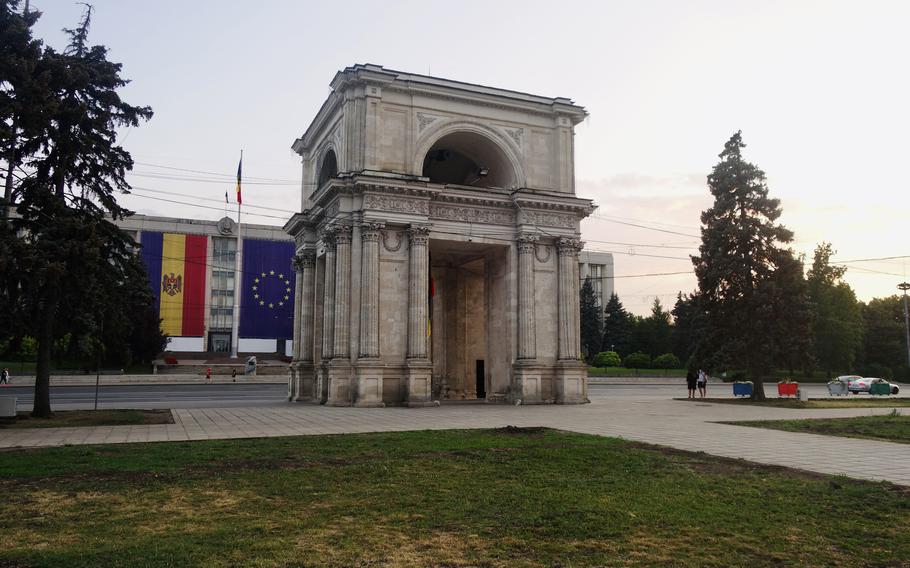
The Triumphal Arch and the Government House, draped in the Moldovan and European Union flags, in Chișinău, Moldova. The country is seeking closer integration with Europe and eventual membership in the European Union. (Svetlana Shkolnikova/Stars and Stripes)
The Defense Department’s State Partnership Program began in the 1990s to help former Soviet Bloc countries reform their militaries and now pairs dozens of state National Guard units with nations around the world. Perhaps the most well-known partnership is between Ukraine and the California National Guard, whose members fielded requests for weapons from old friends in Ukraine as Russia invaded.
The war has increased Moldovan interest in small-unit training as well as the development of a strong corps of non-commissioned officers who bring years of experience and serve as small-unit leaders, said Logsdon. Part of Russia’s sputtering performance in Ukraine has been attributed to a top-down military leadership style that Ukraine, Moldova and other former Soviet countries inherited.
Logsdon said the U.S. embassy in Chișinău hopes to permanently host a non-commissioned officer from the North Carolina National Guard to work full-time with the Moldovans.
“They want to be more mobile,” he said. “You’re not going to have the kind of force that’s going to [defend] against a military perhaps as large as Russia’s but you still want to have self-defense so what do you do? How do you train for those kinds of eventualities? That’s what North Carolina can really help with.”
The rest of the American military, particularly European Command, has also played a role in supporting a country the U.S. considers a democratic partner needed for stability in Europe. Last month, Moldovan service members who had learned mine clearance techniques from American troops began passing on that knowledge to Ukrainian soldiers. The training is taking place at an explosive ordnance disposal facility constructed in 2019 with U.S. funds.
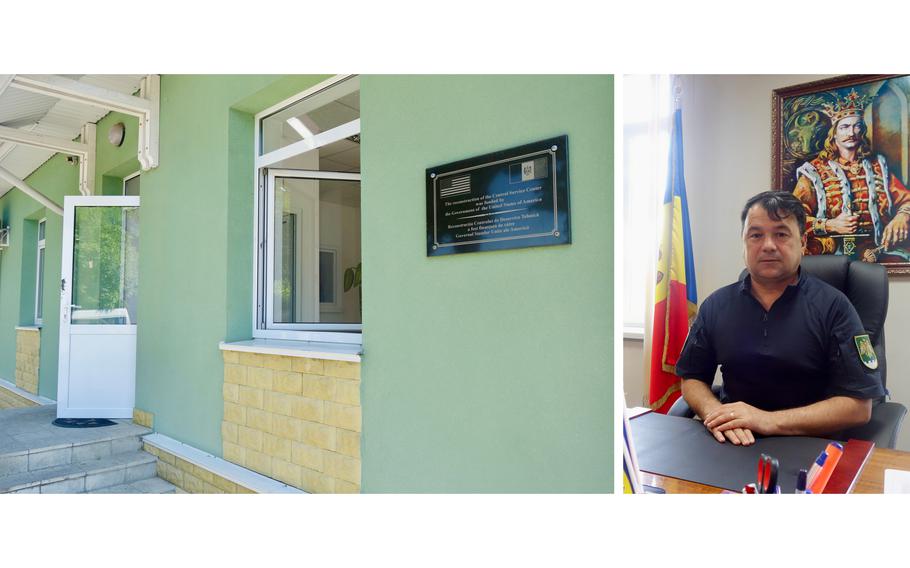
At left is a service center for Moldova’s border police in Chișinău that was reconstructed with U.S. funds. At right is Rosian Vasiloi, the head of Moldova’s border police and a former member of parliament. (Svetlana Shkolnikova/Stars and Stripes)
A mint green building used by Moldova’s border police as a service center in Chișinău exists due to American largesse as well. The border police, once charged with defending Moldova’s borders under the Ministry of Defense and now tasked with surveillance and control, has borne much of the fallout from the war in Ukraine.
About 1 million Ukrainian refugees have fled to Moldova, the highest per capita influx of any neighboring country. A bit more than 100,000 Ukrainians remain, greatly amplifying the use of the Russian language in Chișinău.
Vasiloi, leader of the border police and a former member of parliament, said Moldova had prepared to process up to 7,000 Ukrainian refugees in the first 72 hours of the war but instead saw 12,000 Ukrainians stream in at one crossing point in 24 hours. The demand was overwhelming for a small country considered one of the poorest in Europe.
Today border guards are on the lookout for Ukrainian men trying to illegally cross into Moldova to evade military service, mercenaries who fought for Russia in Ukraine along with other “undesirable individuals” and drug and weapons trafficking. The job turned deadly in late June, when a Tajikistan citizen killed a border guard and a security officer after being denied entry at Chișinău International Airport.
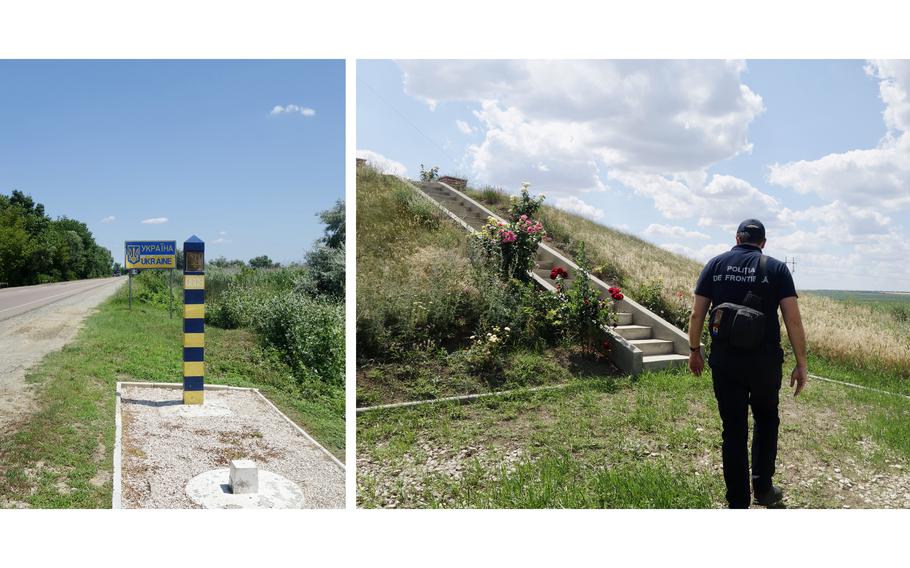
The Moldova-Ukraine border in southeastern Moldova, at left, saw a massive surge of refugees during Russia’s full-scale invasion of Ukraine. At right is an observation point near Palanca, Moldova, where border guards say they can sometimes see Russian warships in the Black Sea fire missiles into Ukraine. (Svetlana Shkolnikova/Stars and Stripes)
Increased information sharing with American colleagues allowed Moldova this spring to monitor, detain and deport a Russian citizen who fought with the notorious Wagner private military company in Syria and Ukraine, said Vasiloi. Moldovan officials have accused the Kremlin of plotting to overthrow the government in Chișinău and use Wagner fighters to stir up unrest.
Moldova continues to battle Russian cyber attacks on its networks and information systems on a regular basis, said Vasiloi. A barrage of attacks came several months before Russian tanks rolled into Ukraine and were fended off with the help of the U.S. The American government almost immediately poured $600,000 into shoring up Moldovan cyber defenses.
“It all happened very fast,” said Vasiloi.
Moldova's border guards are now beefing up surveillance abilities with the help of the U.S. Defense Threat Reduction Agency in anticipation of an expected uptick in weapons smuggling after hostilities in Ukraine end, said Eugen Levco, the border police’s head of international cooperation.
“The amount of money spent on these initiatives may not be that big in the whole scale of the U.S. budget,” he said. “But for countries such as the Republic of Moldova, this kind of investment can truly make a difference.”